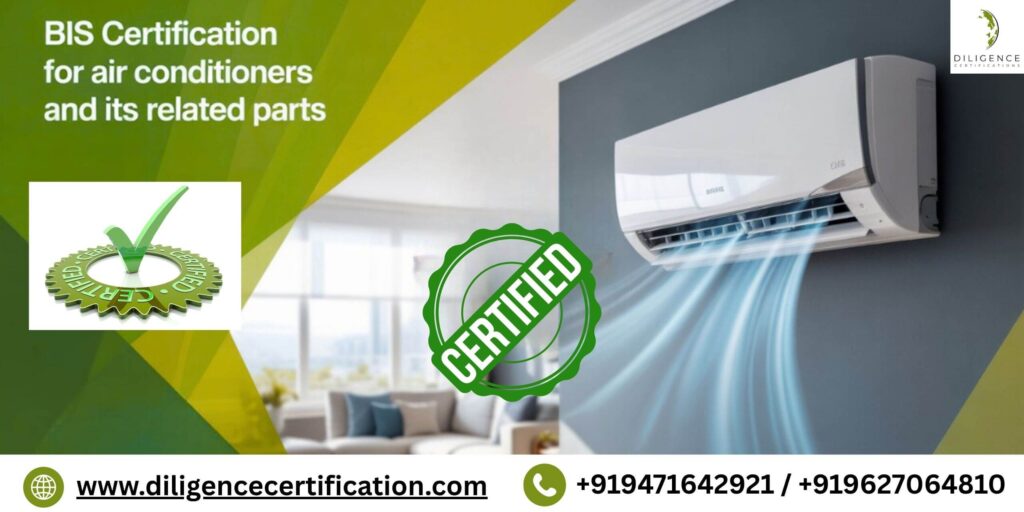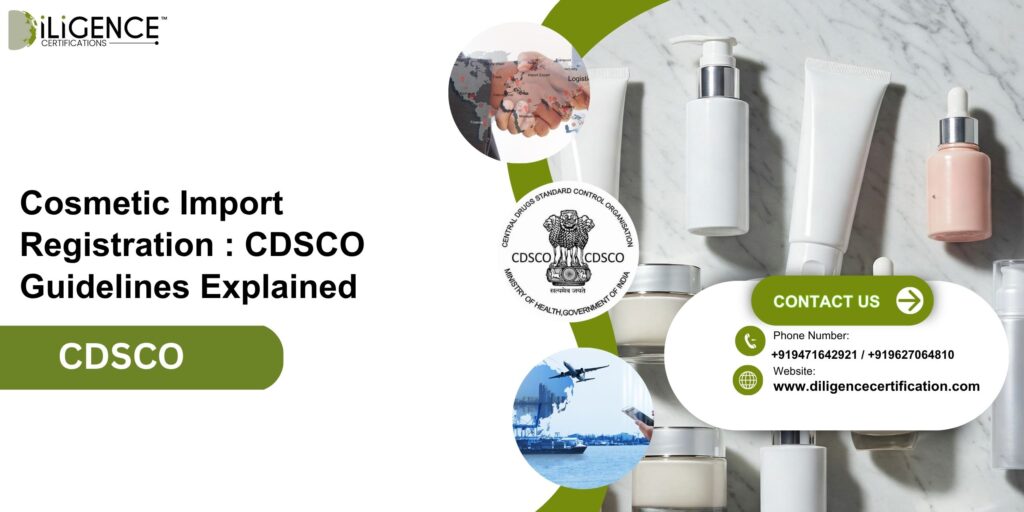- Understand the importance of BIS Certification Standards for Air Conditioning and why it is legally required in India.
- Discover the complete process, documents, eligibility, and BIS standards for ACs to ensure compliance.
- Get expert, end-to-end support from Diligence Certifications — your reliable BIS certification consultant for AC products.
Introduction
Last year, an Indian startup launched an energy-efficient air conditioner designed specifically for tier-2 cities. However, just days before the launch, a full shipment of their ACs was held at Mumbai customs. The reason? No BIS Certification for Air Conditioners. Despite having advanced technology and environmental compliance, they failed to obtain mandatory BIS Certification under the ISI Mark scheme.
This real incident highlights a growing concern: many manufacturers still lack awareness about BIS Certification Standards for Air Conditioning systems. Whether you are an importer, manufacturer, or startup innovating cooling technologies, obtaining a BIS License for AC is not just legal—it’s a strategic business move.
At Diligence Certifications, we guide brands through the complex BIS certification process so they don’t end up learning the hard way.
What are BIS Standards for Air Conditioning?
The Bureau of Indian Standards (BIS) is the national body for standardization, product certification, and quality control. BIS Certification for Air Conditioners ensures that all AC units sold in India meet the Indian safety, quality, and performance benchmarks.
In accordance with the Quality Control Order (QCO) issued by the Ministry of Consumer Affairs, split and window ACs must comply with IS 1391 (Part 1 & Part 2): 2017.
The certification is provided under the ISI Mark Scheme for manufacturers producing ACs domestically or overseas.
Why is BIS Certification Mandatory for ACs?
1. Consumer Safety
Air conditioners involve electrical circuits, refrigerants, and heavy-duty motors. Any compromise in quality can lead to fire hazards, gas leaks, or short circuits.
2. Compliance with Indian Law
As per the Compulsory Registration Scheme and Quality Control Orders, BIS Certification for Air Conditioning is mandatory.
3. Import & Market Access
No BIS License for AC = No market entry. Customs authorities will stop uncertified products.
4. Brand Credibility
An ISI Mark for Air Conditioners builds consumer trust, making your product more competitive.
Different Standards for Air Conditioner Parts
| Indian Standards | Articles |
| IS 1391 (Part 1): 2017 | Room air conditioners – unitary air conditioners. |
| IS 1391 (Part 2): 2018 | Room air conditioners split air conditioners. |
| IS 8148:2018 | Ducted and package air conditioners. |
| IS 11329:2018 | Finned type heat exchanger for room air conditioners. |
| IS 10617:2018 | Hermetic compressor. |
| IS/IEC 60730 (Part 2) Section 9:2011 | Temperature sensing control devices. |
Types of BIS Certification for Air Conditioning!

1. ISI Mark Certification (Scheme I)
- Mandatory for manufacturers (domestic/imported)
- Covers product categories like split and window ACs
- Product must comply with IS 1391: 2017
2. CRS Registration (Scheme II)
Not applicable to ACs directly but relevant if your AC has embedded IT/electronic components that fall under CRS (e.g., remote controllers).
BIS Standards for Air Conditioning
The applicable BIS standard for ACs is:
- IS 1391 (Part 1): 2017 – Room AC (unitary type)
- IS 1391 (Part 2): 2017 – Room AC (split type)
This standard covers energy performance, mechanical construction, refrigerant safety, labeling, and operational testing.
Documents Required for BIS Certification of Air Conditioning
Diligence Certifications helps organize all necessary paperwork:
- Factory license or company incorporation proof
- ISO 9001 certificate (if available)
- Product drawings with circuit diagram
- Internal test reports from manufacturer
- Details of manufacturing process
- Trademark registration copy (if applicable)
- Authorization letter (for agents or Indian representatives)
- User manual and product label sample
- Copy of MOA and AOA (for companies)
- BIS test reports from BIS-approved labs
Process to Get BIS Certification for Air Conditioning
Step 1: Product Testing
Send AC samples to a BIS-recognized laboratory for testing as per IS 1391 standards.
Step 2: Application Submission
File Form VI via the BIS portal along with required documents and fees.
Step 3: Factory Inspection
BIS authorities inspect the manufacturing facility (for ISI Mark Certification).
Step 4: Grant of License
Once product and facility comply with BIS norms, the BIS License for AC is issued.
Step 5: Use of ISI Mark
After approval, the manufacturer can legally use the ISI Mark for Air Conditioners.

Eligibility Criteria for BIS Standards for Air Conditioning
- Manufacturer Only: Only AC manufacturers (not traders) are eligible.
- Factory Address: Must be operational and verifiable.
- Indian Representative: Foreign manufacturers must appoint an AIR (Authorized Indian Representative).
- Product Scope: Must fall under IS 1391 (Part 1 or 2).
Validity & Renewal of BIS License for AC
- Initial Validity: BIS certification is valid for 1 year.
- Renewal: Can be renewed for up to 5 years depending on compliance.
- ISI Mark Use: Continues until the license is valid.
Benefits of BIS Certification for Air Conditioning
- Legal Market Entry: Avoid customs delays and penalties.
- Consumer Confidence: ISI Mark assures buyers of quality.
- Increased Sales: Retailers and ecommerce prefer certified products.
- Global Expansion: Helps in meeting other international standards.
- Risk Mitigation: Reduces liability risks associated with product failure.
BIS standards vs international norms
The answer lies in India’s unique climate and grid conditions.
| Parameter | BIS Standards (India) | CE / UL (Europe / US) |
| Ambient conditions | 43-45°C testing | 35°C typical |
| Voltage fluctuations | Indian grid tolerance tested | Stable grid assumed |
| Labeling | Mandatory tonnage, wattage in Indian units | Regional labeling norms |
| Energy tests | IS 1391 compliance | EU/US energy codes |
ISI Mark for Air Conditioners: What It Guarantees
The ISI mark you see on an air conditioner in India is more than just an ordinary sticker. It guarantees:
- That cooling performance has been tested and certified independently
- Safety parameters for application of electricity, mechanically; also safety of the refrigerant
- Energy consumption agreed with energy efficiency regulatory standards of India
- Traceability through a license manufacturer
This mark has safeguarded Indian consumers for many years. It is illegal to sell or import any AC in India without the ISI Mark whenever it falls within the mandatory list. For air conditioners, this implies window-type and split-type ACs as per IS 1391 standards.
A number of my consulting clients, mainly foreign brands, face heavy resistance with the ISI Mark process as their foreign plants never underwent any Indian audit before. In such a scenario, using the services of a BIS certification consultant can save months of confusion.
Common mistakes really: lessons from real clients
In my view, here are some very typical BIS certification traps that brands, both Indian and foreign, undergo:
Non-conformity of labels: For a European client, ACs had been submitted with a cooling capacity mentioned only in BTU/hr. BIS insisted that capacity be given in tons and watts, as per Indian standards. The shipments were stranded at the port for six weeks.
Unapproved factory location: An importer was trying to shift the production from his approved China plant to a sister factory without informing BIS. License suspended and fresh application should be filed.
Non-matching samples: The given brand used to send some samples for the tests that were not at all matching with their production models. The BIS labs outright rejected the test results. Delay in factory
Audit readiness: Local manufacturers, at times, tend to delay readiness for BIS audits-they are missing test reports or quality records-so these come to a halt for the license to be granted.
Conclusion
In India, air conditioners have stopped being a mere seasonal luxury and have become a household need; BIS standards for air conditioning thus protect consumers and create a level playing field for genuine brands. Trust me from having worked with dozens of manufacturers and importers: if you want to do business responsibly in India, then BIS conformity is no longer just something desirable.
If you plan on putting a new inverter AC brand into the market or importing overseas split systems, plan the BIS certification for AC well in advance. Product labelling, factory audit readiness, and in-house testing labs need to be looked into. These nitty gritty details are what may make or break your BIS Certification for Air Conditioning.
Please do not treat ISI Mark for Air Conditioners as a mere sticker. Actually, the ISI mark speaks louder than words; it says that you are earnestly interested in your customers’ safety, electricity bills, and peace of mind.
There are milestones of Indian HVAC startups winning market share because it showcased BIS certification with pride at trade shows, while a big foreign company lost sales worth weeks because of a missed marking detail. That really is the compliance story.
If you operate a manufacturing facility or import machinery into India or even into an industry distributor and have any questions regarding the BIS standards for air conditioning, please do not hesitate to get in touch. As a consultant for BIS certification consultant, I help brands to clear these compliance hurdles faster and more confidently, allowing you to focus on designing great cooling solutions for India’s customers.
Why Clients Choose Diligence Certifications:
We simplify the complicated BIS certification process, even if an applicant comes for the first time.
Foreign AC brands can depend on us for establishing AIR quickly and getting the BIS license.
We reduce your time to order combinations with documentation and pre-inspection strategies.
While you’re readying your next-gen inverter AC or importing a world-class brand for ISI marking, let us help you do it in a smart way.
- Don’t wait until customs hold your shipment.
- Or don’t risk a legal action and trust from its customers.
- Do the smart thing—partner with Diligence Certifications today.
Speak to us today and begin your journey of BIS Certification that makes your air conditioners ready for compliant success in the competitive market of India.
Frequently Asked Questions
What is the cost of BIS Certification for Air Conditioners?
The cost varies depending on lab testing fees, application fees, and consultant charges. For a rough idea, it can range from INR 50,000 to 2 lakhs. Diligence Certifications offers a detailed quote based on your product and location.
How long does it take to get a BIS Certificate for AC?
Typically, the entire process takes 4–6 weeks. Delays can occur due to incomplete documentation or test failures. Working with experts like Diligence Certifications can reduce delays.
Is BIS Certification mandatory for imported air conditioners?
Yes, it is compulsory. Imported ACs must comply with IS 1391 standards and carry an ISI Mark. Customs clearance will not happen without it.
Can traders or distributors apply for BIS Certification?
No. Only manufacturers (domestic or foreign) can apply for a BIS License for AC. Traders must coordinate with OEMs for certification.
What happens if I sell ACs without BIS Certification?
Selling uncertified ACs is a legal offense. BIS authorities can impose fines, ban the product, or take legal action under the BIS Act.
What’s the difference between ISI Mark and BIS Certification?
BIS is the certifying authority. ISI Mark is the logo that indicates certification. If an AC is BIS certified, it must display the ISI Mark.
Do inverter ACs need separate BIS certification?
No separate certification is required if they fall under IS 1391 standards. However, their energy efficiency and internal circuits must be tested accordingly.
Can Diligence Certifications help with foreign manufacturer certification?
Absolutely. We assist foreign brands with AIR appointment, product testing, documentation, and BIS license procurement in India.
What if my product fails the BIS test?
You can rework the product and reapply. Our consultants at Diligence Certifications help with corrective actions and re-testing support.
Is BIS Certification the same as BEE star rating?
No. BIS Certification ensures safety and quality compliance. BEE rating is about energy efficiency. Both may be required for selling in India.








 BIS Certification
BIS Certification
 CDSCO
CDSCO
 CPCB
CPCB
 LMPC
LMPC
 WPC Approval
WPC Approval
 Global Approvals
Global Approvals
 TEC
TEC
 ARAI
ARAI
 BEE
BEE
 ISO Certification
ISO Certification
 Drone Registration
Drone Registration
 NOC For Steel
NOC For Steel



















 Business Registration
Business Registration















 Legal Services
Legal Services
 Trademark Registration
Trademark Registration
 Copyright Registration
Copyright Registration
 Patent Registration
Patent Registration
















































